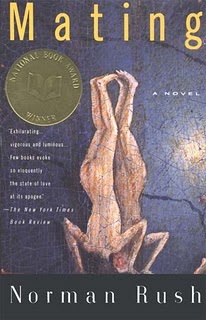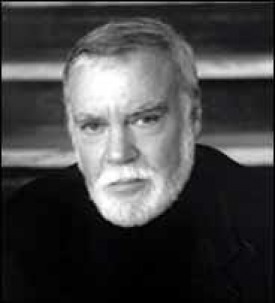When I read novels and I happen upon concepts or words I’m unfamiliar with, I tend to fold the page down and return to investigate a few hours later, when I have my laptop open before me. But in the case of Mating, by Norman Rush, I found myself turning down so many pages that I renounced my normal habit and sat my laptop down right beside me.
Mating, written in first person narration, is peppered with intellectual dialogues, historical references and phrases from a variety of origins. The plot itself addresses questions that have remained unanswered in the minds of many of the greatest thinkers, questions of love and human relationship and of the patterns that seem to dictate our interactions, regardless of our desire for change.
Addressing issues of feminism, socialism, and post-colonial development, Norman Rush leaves almost no stone unturned. The narrator, a somewhat likable graduate student with a wandering thesis, is female, and her attention, despite her aims otherwise, becomes absorbed on creating and sustaining a relationship with an older, more accomplished man.
The man, Nelson Denoon, has largely abandoned academic opportunities in the West to fund and create an experimental utopian society run largely by disenfranchised African women. It is this society, Tsau, that serves as the backdrop of Nelson and the narrator’s relationship, a relationship that evolves slowly but soon begins to unravel as Platonic ideas of love and equal partnership begin to dissolve.
The reader is presented with two characters that both have aims at finding and creating an ideal. While the narrator is fixated on the possibility of an equal soul-mate relationship, her partner is absorbed with the task of creating a utopian society that corrects many of the ills of ages past. In both cases, each present finely articulated and intelligent plans, but reality proves that the world cannot be reduced to thesis statements. Instead, both Nelson and the narrator’s belief systems are complicated and overlap constantly, and while they both purport strong convictions, their lives prove that constant integrity to those ideals is an impossible goal.
This novel is not for the light reader. Norman Rush takes you on an exhilarating and confusing ride through the heart of Africa and the still uncharted territory of the human heart. As an examination of two academics, the text is littered with language that requires a solid sense of history and philosophy. But the questions that Rush raises and the images he creates are worth any labor the reader must endure.
Mating, written in first person narration, is peppered with intellectual dialogues, historical references and phrases from a variety of origins. The plot itself addresses questions that have remained unanswered in the minds of many of the greatest thinkers, questions of love and human relationship and of the patterns that seem to dictate our interactions, regardless of our desire for change.
Addressing issues of feminism, socialism, and post-colonial development, Norman Rush leaves almost no stone unturned. The narrator, a somewhat likable graduate student with a wandering thesis, is female, and her attention, despite her aims otherwise, becomes absorbed on creating and sustaining a relationship with an older, more accomplished man.
The man, Nelson Denoon, has largely abandoned academic opportunities in the West to fund and create an experimental utopian society run largely by disenfranchised African women. It is this society, Tsau, that serves as the backdrop of Nelson and the narrator’s relationship, a relationship that evolves slowly but soon begins to unravel as Platonic ideas of love and equal partnership begin to dissolve.
The reader is presented with two characters that both have aims at finding and creating an ideal. While the narrator is fixated on the possibility of an equal soul-mate relationship, her partner is absorbed with the task of creating a utopian society that corrects many of the ills of ages past. In both cases, each present finely articulated and intelligent plans, but reality proves that the world cannot be reduced to thesis statements. Instead, both Nelson and the narrator’s belief systems are complicated and overlap constantly, and while they both purport strong convictions, their lives prove that constant integrity to those ideals is an impossible goal.
This novel is not for the light reader. Norman Rush takes you on an exhilarating and confusing ride through the heart of Africa and the still uncharted territory of the human heart. As an examination of two academics, the text is littered with language that requires a solid sense of history and philosophy. But the questions that Rush raises and the images he creates are worth any labor the reader must endure.


 RSS Feed
RSS Feed
